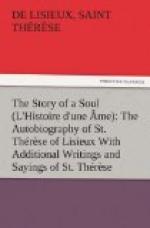But our very own ideas, the fruit of our mind and heart, form a treasury on which none dare lay hands. For instance, if I reveal to a Sister some light given me in prayer, and she repeats it later on as though it were her own, it seems as though she appropriates what is mine. Or, if during recreation someone makes an apt and witty remark, which her neighbour repeats to the Community, without acknowledging whence it came, it is a sort of theft; and the person who originated the remark is naturally inclined to seize the first opportunity of delicately insinuating that her thoughts have been borrowed.
I could not so well explain all these weaknesses of human nature had I not experienced them. I should have preferred to indulge in the illusion that I was the only one who suffered thus, had you not bidden me advise the novices in their difficulties. I have learnt much in the discharge of this duty, and especially I feel bound to put in practice what I teach.
I can say with truth that by God’s grace I am no more attached to the gifts of the intellect than to material things. If it happens that a thought of mine should please my Sisters, I find it quite easy to let them regard it as their own. My thoughts belong to the Holy Ghost. They are not mine. St. Paul assures us that without the Spirit of Love, we cannot call God our Father.[1]
And besides, though far from depreciating those beautiful thoughts which bring us nearer to God, I have long been of opinion that we must be careful not to over-estimate their worth. The highest inspirations are of no value without good works. It is true that others may derive much profit therefrom, if they are duly grateful to our Lord for allowing them to share in the abundance of one of His privileged souls; but should this privileged soul take pride in spiritual wealth, and imitate the Pharisee, she becomes like to a hostess dying of starvation at a well-spread table, while her guests enjoy the richest fare, and perhaps case envious glances at the possessor of so many treasures.
Verily it is true that God alone can sound the heart. How short-sighted are His creatures! When they see a soul whose lights surpass their own, they conclude that the Divine Master loves them less. Since when has He lost the right to make use of one of His children, in order to supply the others with the nourishment they need? That right was not lost in the days of Pharaoh, for God said unto him: “And therefore have I raised thee, that I may show My power in thee, and My name may be spoken of throughout all the earth."[2]
Generations have passed away since the Most High spoke these words, and His ways have not changed. He has ever chosen human instruments for the accomplishment of His work.
If an artist’s canvas could but think and speak, surely it would never complain of being touched and re-touched by the brush, nor would it feel envious thereof, knowing that all its beauty is due to the artist alone. So, too, the brush itself could not boast of the masterpiece it had helped to produce, for it must know that an artist is never at a loss; that difficulties do but stimulate him; and that at times it pleases him to make use of instruments the most unlikely and defective.




